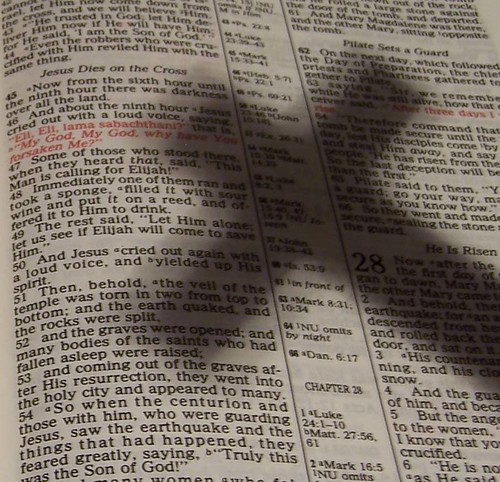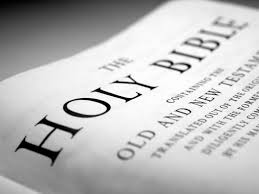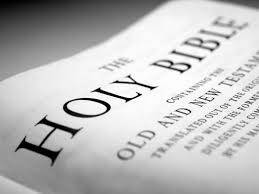
Bible
Podcast Episode #6 – P2 The Character of Scripture
Podcast Episode #6 – P2 The Character of Scripture (Transcript)
Hello, this is Mahlon Smith, and I welcome you to Episode #6 of the Growing Christian Resources podcast, where today we will conclude a two-part series on the subject: The character of Scripture. In this podcast, the aim is to equip followers of Jesus Christ with the practical, doctrinal and supernatural tools they need to live daily for Jesus Christ. If you are listening and are not a Christian, I invite you to consider what is discussed in today’s podcast. Romans 10:9 states: “if you will confess with your mouth Jesus is Lord, and believe in your heart that God raised Him from the dead, you will be saved.” At the end of this program I will mention a couple tools that you can look at online to enhance your understanding of God’s Word and the Christian life.
In addition to 2 Timothy 3:16, another key scripture that we can consult when defining the character of scripture is found in 2 Peter 2:20-21 “Above all, you must understand that no prophecy of Scripture came about by the prophet’s own interpretation of things. 21 For prophecy never had its origin in the human will, but prophets, though human, spoke from God as they were carried along by the Holy Spirit.”
These two scriptures providing the starting point for understanding what type of book the Bible is. Today we will continue exploring the character of scripture as outlined by the BFM 2000. For sake of reference, let me mention once again that statement, and then zero in on the four remaining characteristics of the Bible’s character that we aim to cover in today’s podcast.
Here is the BFM statement: “The Holy Bible was written by men divinely inspired and is God’s revelation of Himself to man. It is a perfect treasure of divine instruction. It has God for its author, salvation for its end, and truth, without any mixture of error, for its matter. Therefore, all Scripture is totally true and trustworthy. It reveals the principles by which God judges us, and therefore is, and will remain to the end of the world the true center of Christian union, and the supreme standard by which all human conduct, creeds, and religious opinions should be tried. All Scripture is a testimony to Christ, who is Himself the focus of divine revelation.”
In last week’s episode we learned the character of scripture to be:
1. The Holy Bible; 2. Divinely Inspired and 3. God’s revelation. Today we will round out our discussion by considering the remaining four traits and then conclude by reminding the reader of all the traits we covered in defining the character of scripture. We discover from this statement that scripture is….
“without any mixture of error” This next phrase that we come across in the BFM 2000 refers to what Bible teachers call “inerrancy”. Literally, the words of the Bible are without error. Inerrancy refers materially to the original manuscripts of the Hebrew Old Testament and the Greek New Testament. When we say “materially”, we mean that the “material”, the “words” of the original Hebrew, Aramaic and Greek manuscripts of the Bible had no errors. Since those originals are no longer in existence, all of the copies and translations are formally inerrant. The term “formal” refers to doctrines, historical and scientific information and any idea preserved in the faithful translations and copies of those manuscripts. I can tell you from having worked in Hebrew and Greek for nearly 20 years (to God be the glory), that you have nothing to fear in regards to your English Bible – it is God’s Word.
Jesus and the Apostles themselves used the Greek Translation of the Hebrew Old Testament, treating it as carrying the authority of inerrancy. Whenever an Apostle quoted the Old Testament in the New Testament, they mainly quoted from the Greek translation of the Hebrew Old Testament. Jesus Himself noted that “heaven and earth may pass away, but that God’s Word would never pass away”. (Matthew 5:18) That includes the copies and translations of the Bible! As a pastor, I can hold up my English Bible and confidently say that it does not merely contain the Word of God, nor become the word of God when I read it but that it is the inerrant and infallible Word of God. As the 2000 BFM states: “It has God for its author, salvation for its end, and truth, without any mixture of error, for its matter.” Therefore I can literally say without apology that the English Bible I preach from is as much the Word of God as the originals – since God’s perfect truth preserved could never derive from an imperfect source. (Psalms 12:6; Proverbs 30:5). So the character of scripture is that it is without mixture of error and then notice next…
“Therefore, all Scripture is totally true and trustworthy“ With the authority of scripture’s inerrancy flowing from perfect original manuscripts and extending such authority down through the copies and translations, what about the matter of trustworthiness? Bible teachers calls this “infallibility”, meaning that the Bible is incapable of leading you astray. Inerrancy deals with the contents and wording of the text, whereas infallibility deals with the intent and conclusions of the text. Jesus in John 10:35 said the scripture cannot be broken. The Bible is thus trustworthy and cannot ever lead you astray. It is without mixture of error. We have already seen it is the Holy Bible, Divinely inspired and God’s revelation. Let’s see the sixth trait, namely…
“It reveals the principles ” This is the beginning of the next to last sentence in the first article of the 2000 BFM. What follows in this sentence speaks to what Bible teachers call the scripture’s sufficiency. Is the Bible enough to give us universal truths that we can apply to specific situations touching history, eternity and personal life? These universal truths, communicated through the words of scripture, are what we call principles. We must confess as Christians that the Bible is indeed sufficient in covering what God desires us to know and apply for everything.(1 Corinthians 10:6). So with all the other various traits of scripture’s character covered, lets consider the seventh one as stated in the BFM 2000, namely…
“All Scripture is a testimony” What is a testimony? It is a clear statement of what someone saw or experienced in their life. The idea of extracting from scripture what God communicates and testifies about Jesus Christ’s person and mission speaks to the Bible’s clarity. The Bible is not merely a witness of God’s revelation, rather God chose to witness of Himself through the Bible. The Bible is God’s revelatory testimony of His mind to man! Is the Bible a book of riddles and puzzles – or is it clearly understandable to the born-again child of God who reads it through the illuminating ministry of the Holy Spirit? We can only answer in the affirmative. (1 Corinthians 2:12-16) This is why preachers preach it, teachers teach it and all Christians are to live God’s book – since it is His testimony about His Son – Jesus Christ. (Luke 24:44)
As close out today, we have learned from looking at the BFM 2000 the following seven traits that aid us in understanding the character of scripture:
- The Holy Bible
- Divinely Inspired
- God’s revelation
- Without any mixture of error
- Totally True and Trust worthy
- Reveals the Principles
- All Scripture is a testimony
Well that closes out this episode of today’s program. If I may, let me point you to two blog sites that contain resources for you to grow in Jesus Christ. The first is the daily blogsite: pastormahlon.blogspot.com. There you will find over 1,000 resources to aid you in the supernatural, doctrinal and practical aspects of the Christian walk. The second blogsite is a resource for those wanting to dig deeper: biblicalexegete.wordpress.com. May God richly bless you and thanks for listening.
Podcast Episode # 5 P1 – Understanding the Character of the Scripture
Transcript: Podcast Episode #5 P1-The Character of Scripture
Hello, this is Mahlon Smith, and I welcome you to Episode #5 of the Growing Christian Resources podcast, where today we will begin a two-part series on the subject: The character of Scripture. In this podcast, the aim is to equip followers of Jesus Christ with the practical, doctrinal and supernatural tools they need to live daily for Jesus Christ. If you are listening and are not a Christian, I invite you to consider what is discussed in today’s podcast. Romans 10:9 states: “if you will confess with your mouth Jesus is Lord, and believe in your heart that God raised Him from the dead, you will be saved.” At the end of this program I will mention a couple tools that you can look at online to enhance your understanding of God’s Word and the Christian life.
As I just mentioned a moment ago, we are beginning a two-part series on the subject: “The character of the Scripture”. Due to the importance and sheer size of this topic, I felt it necessary to spread it out over two podcasts. I welcome you to come back to next week’s podcast where we will conclude this very important discussion on the character of scripture. When I say “character of Scripture”, to what am I referring? I’m specifically dealing with what kind of book is the Bible as the only written document revealed by God. A key verse that is used often in beginning to explore this subject is 2 Timothy 3:16-17 “All Scripture is inspired by God and profitable for teaching, for reproof, for correction, for training in righteousness; 17so that the man of God may be adequate, equipped for every good work.”
The Bible as God’s supreme, authoritative, and written Divine revelation is at the heart of defining its character. However what characteristics are included when describing the character of “scripture”? Why is it unique and why must all other authorities be considered secondary? As a Bible believing Christian who serves as a pastor in the Southern Baptist Convention, I subscribe to the doctrinal statement of the SBC called “The Baptist Faith and message 2000”. That statement serves as a secondary form of authority in comparison to the Bible that serves to explain key truths taught by the SBC in its understanding of scripture.
I want to read to you what the Baptist Faith and message 2000 has to say about the character of scripture and then use it to discover specifically why the Bible alone is worthy of being called “God’s only written form of Divine revelation. This is what it says: “The Holy Bible was written by men divinely inspired and is God’s revelation of Himself to man. It is a perfect treasure of divine instruction. It has God for its author, salvation for its end, and truth, without any mixture of error, for its matter. Therefore, all Scripture is totally true and trustworthy. It reveals the principles by which God judges us, and therefore is, and will remain to the end of the world the true center of Christian union, and the supreme standard by which all human conduct, creeds, and religious opinions should be tried. All Scripture is a testimony to Christ, who is Himself the focus of divine revelation.” In this opening article on the Bible we find seven phrases that are very helpful in unpacking for us the character of the Bible. I will list out those seven phrases and then we will unpack the first three of them today, with the remaining four being the focus of next week’s podcast.
Here are those seven phrases:
- The Holy Bible
- Divinely Inspired
- God’s revelation
- Without any mixture of error
- Totally True and Trust worthy
- Reveals the Principles
- All Scripture is a testimony
So lets focus briefly on those first three, first…
“The Holy Bible” I’m sure on most Bibles you have seen this phrase “The Holy Bible”. Why do we call it that? The term “Holy” means “to be set apart”, “ to be in a unique category” and “to be pure”. The Bible is of course the Book of Books, God’s Divine Library. Just some quick facts about its contents will show you why the Bible is worthy of the title: The Holy Bible.
The Bible is composed of 66 books, written by 40 authors, in three languages, over 1500 years, on three continents. The Holy Spirit of God moved upon these men to compose the more than 774,000 words of the Bible – with each author writing in literary styles of poetry, history, narrative, commands, letters, biographical sketch and prophecy. The unity of scripture is testimony to its Divine authorship, as well as the sheer amount of fulfilled prophecy. More than 800 prophecies are found in the Bible. Concerning Jesus Christ – 109 were fulfilled in His first coming, and 224 point us to His second coming. The Bible alone is unique in containing fulfilled prophecy – no other so-called Holy book as even one example. Thus the Bible is a product of God the Holy Spirit working through the writing styles and languages of the Prophets and Apostles. (2 Peter 1:21) So the character of the scriptures includes the idea of it being “The Holy Bible”. But notice secondly…
“Divinely Inspired” This phrase deals with how the Bible was produced. The term literally means “God breathed”. Just as God breathed into the nostrils of Adam, making him a “living soul” (Genesis 2:7), so did God the Holy Ghost breath through the words of the Prophets and Apostles to make a living book – God’s Book – the Bible. (2 Timothy 3:16-17) As a Divinely inspired work, the 66 books of the Bible each are used by the Spirit of God to bring about conversion – since no one believes on the Lord apart from scripture. (Psalm 19:7; Romans 10:17). So the Scriptures are Holy, Divinely Inspired and now notice thirdly….
“God’s Revelation” Revelation refers to God making known what was previously unknown. Deuteronomy 29:29 tells us that the unrevealed things belong to God while the revealed things belong to us and our children. God did not disclose His will without first making His words known to His prophets in the Old Testament and His Apostles in the New Testament. (Amos 3:7; John 14) The Bible is God’s revelation in written form. The 2000 BFM refers to the Bible as Divine revelation or as revealing God’s will on three occasions. Thousands of scriptures have the phrase “thus saith the Lord” – lending to the designation of the Bible as “God’s revelation”.
Thus these three terms: Holy Bible, Divinely inspired and God’s revelation aid us in understanding the nature of God’s Book – the Bible. As I said at the beginning of today’s podcast, we will continue on this discussion in next week’s episode. For now we close out this episode of today’s program. If I may, let me point you to two blog sites that contain resources for you to grow in Jesus Christ. The first is the daily blogsite: pastormahlon.blogspot.com. There you will find over 1,000 resources to aid you in the supernatural, doctrinal and practical aspects of the Christian walk. The second blogsite is a resource for those wanting to dig deeper: biblicalexegete.wordpress.com. May God richly bless you and thanks for listening.

